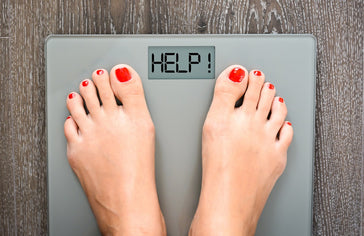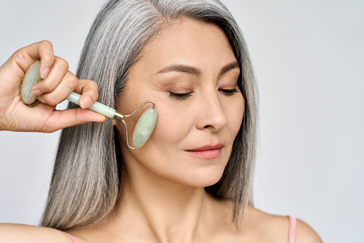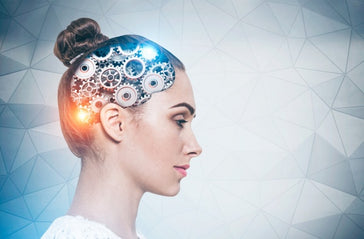Feeding Your Brain: The Gut-Brain Connection
Posted by Mike Miryala on
All right, welcome back everybody. This is Becky Williams and this week I am talking to you about your gut and your brain. Up until recently, people didn't realize that they were actually connected. So if there was ever a time to talk about digestive health, this is it.
It is true digestive health is very important. Actually, some people even call your gut your second brain and probably by now you've heard this news. But up until recently, this was not understood. This was not discovered. So we always thought that a digestion and your thoughts, your emotions and all that kind of stuff was separate, but it's actually not. Okay.
There is no denying it anymore. Lots of research has gone through. Now we understand that there is a really big connection between both of these. Okay. This new scientific discoveries about the vagus nerve, the enteric nerve system and the amazing influence that your gut microbiomes have. It's becoming clearer and clearer and clearer that when you eat it not only feed your body, but also directly influences your brain.
I did touch on this a little bit when I talked about coffee with emotions and how your body metabolizes coffee or caffeine in general. Mainly about coffee, though. Okay, so you're probably not that surprised, but I'm going to go ahead and dive a little bit deeper because there is a little bit of this that you may not know. You may understand that they're connected, but not quite how they're connected. Okay. It's very complex. Let's just be honest. So we're going to touch the tip of the iceberg today.
There are multiple systems that are working together to make this gut-brain connection work. Things like the vagus nerve, this is going to link the gut directly to your brain. Also, the enteric nervous system, which a lot of people like myself called the second brain. It helps the complex intricacies of digestion flow with little to no involvement from the actual brain. Which to me is just so neat that it's just like a little system working by itself. It's like working in the background.
Also, the massive amount of neurotransmitters. That's a real big buzzword right now produced by the gut. The huge part of the immune system that is in the gut can also travel throughout the body, right, from your brain through your gut. It's traveling like a big highway. But also the interactions and messages sent to your gut microbiome. All of these things have to do with the gut-brain connection. It's all very complex. It's also fascinating how it works. So I'm briefly going to talk about all these, just not all of them, but most of these important parts. And then, of course, I'm going to end with a delicious recipe as always.
Okay, so the first one I want to talk to you about is the vagus nerve. This is the nerve that directly runs from your brain to your gut. You probably know by now that this is, you know, 90% of the digestion happens here. Do you understand how digestion works? That is not this video. I can talk about it in a later video if you want, but you understand, okay. So not from your brain to your gut, which is what we used to think is how these were connected, but actually from your gut to your brain. So instead of your brain telling your gut what to do, your gut is actually communicating with your brain.
All right, the enteric nervous system and neurotransmitters. Would you believe me that if I told you that the gut actually has more nerves than your spinal cord? I really thought that was a neat fact to share with you guys. Also, it's referred to as the second brain. So if you think about it, controlling complex processes like digestion, digestive enzymes, absorption of nutrients, the flow of food, that kind of stuff, this should probably be done pretty smartly, right? It is a very important system that's going to have to be going all the time.
And guess how these nerves speak to each other and other cells? You guessed it. Chemical messengers called neurotransmitters. In fact, many of the neurotransmitters that have a strong effect on mood, they're actually made in the gut. Like 95% of serotonin, which is the happy hormone, that's made in your gut. That's astounding and very important. If for nothing else, if for no other reason, then just to know that you can make serotonin in your gut and it's based on what you're eating, how well that is going to the rest of your body, that's worth it to me to be eating healthy.
Okay, the immune system of the gut is the next thing we're going to talk about. Eating and drinking is a huge portal where disease causing critters can get into your body. It makes total sense that this is where our defense system would be as well. Okay, so 75% of our immune system is in our gut. And you know immune cells do move throughout your entire body and cause inflammation just about everywhere else, right? So what this means is if they are activated by something in the gut, they can potentially wreak havoc anywhere in the body, including the potential to cause inflammation in your brain.
Alright, so there's different books that have been written about this kind of stuff. Grain brain, things like that, talking about stuff that you put in your body that affects your gut, which affects your brain.
Also, we've talked about, I think we've talked about in a previous video, gut permeability. Talking about playing Red Rover and you know you've got two of the weak kids that are here, that food and stuff. In my example, you know it's easy to break through the walls, but if your immune system is not secure and it's not healthy, it's going to be very simple for things to go through your gut lining, which causes autoimmune diseases, it causes all kinds of issues. So having a nice, tight, secure gut lining is going to make all the difference in the world here for your immune system. And now we know that the immune system, 75% of it's in the gut. There you go. So when you're not eating well, you have gut permeability here, you can see where the rest of your body, including your brain, is just going to be having a lot of issues.
All right, next is talking about gut microbes. Gut microbes, sorry. So these are your friendly neighborhood gut residents. You have billions of these little guys happily living in your gut. They do amazing little things. These are like the little village workers, okay. They make certain vitamins, they help regulate inflammation, they help you digest certain foods. These are some hard workers. But more and more evidence is showing that changes in your gut microbiome can impact your mood. Or even more serious, can impact mental health issues.
All right, so how are these all working for your brain? Like how I understand how all these are separate, but how are these going to work together for your brain? The honest answer to how these things work together is that we don't know. We know some things, but we do not have the whole picture. But more and more studies are being done so that we can learn more.
One thing is becoming very, very clear is that a healthy gut goes hand in hand with a healthy brain. That one we know for sure. Okay, so how do you feed your brain, right? Well, your brain is not going to have food like what you can put into your body for your gut. So how are you going to feed your brain? Do you need to be buying supplements? Do you need to do MCT oil? Do you need to get brain octane from different companies, all that kind of stuff? Okay, of course, a variety of minimally processed nutrient dense foods is required, which is what we have here. No matter which meal plan that you're following that we have, if you're doing keto, if you're doing AIP, if you're doing paleo, all of these are going to be minimally processed nutrient dense food.
All of these are important, but no nutrients work alone, right? Nothing is in of itself the ultimate answer. It's going to always be a joint effort. The best thing to start with is fiber. So fiber can be found in fruits, vegetables, nuts, and seeds. We found other places, but these are going to be your heavy hitters. You're going to get the most for what you're consuming. This also helps to feed your gut microbes. Okay, those little workers, those little village people that are helping inside your gut.
Another great brain food is omega-3 fatty acids. Here in the US, a lot of times we are not having enough omega-3s and we're having way too many omega-6s. So when you have that balance that is just way off kilter, it really is not good for your brain. So getting in enough brain food of omega three fatty acids, you can find that in fatty fish, walnuts, algae, and seeds like flax, chia, and hemp. Okay, these are all also known for lowering inflammation in your brain and also in your body because it's all connected, right? All right, I think you're catching on.
Also, berries are a very delicious way to pump up your brain health. Flavonoids in berries, which is what gives them their color, has been proven to improve memory and slow memory decline. Plus, they're just delicious, right?
All right, speaking of memory, scientists have also found that caffeine and tea and coffee, besides offering a temporary boost in concentration, also helps to solidify new memories. So if you're like I am and you like to create memories, sitting around drinking coffee with your family, here you go. This may help you to solidify those memories.
Okay, after a quick and easy delicious way to get these tasty brain boosting foods, I have a recipe for you. Now, this recipe was originally for overnight oats, but I know that on keto, paleo, and AIP, oats are not going to be friendly for any of you that are following these plans. So the team got together, we edited this just a little bit.
So this is going to be a Blueberry Hemp Overnight Oats Recipe. This is going to serve two people, but because we took out the oats in this, it may only serve one. So if you eat one serving and you're still hungry, go ahead and eat the whole thing. It's not going to hurt anything, okay?
- 1 cup of blueberries, fresh or frozen. I personally like frozen. Okay, you're putting these in overnight, it's just going to give it the right crunch and the right consistency. That's just my opinion.
- 1 cup of almond milk. Please make sure it's unsweetened.
- 1 Tablespoon of chia seeds
- 2 Tablespoons of hemp seeds
- ½ teaspoon of cinnamon
- 1 banana sliced
- ¼ cup of chopped walnuts
So what you're going to do is you're going to blend your blueberries in the food processor until they're smooth. And you're going to mix the blueberries, the almond milk, the chia seeds, the hemp seeds, all of that into a bowl. It's going to be a gorgeous color, which is helpful to eat as well. I love colorful foods. They just make me want to dive in. Let it sit in the fridge overnight. So if you are really busy, if you work outside the home, whatever. This is a really good recipe. So you can put it out at night and then in the morning, you're ready to go. Let it sit in the fridge overnight. Split it into two bowls if you want, or if it's just for your serving. I personally like to put this in a mason jar. This just makes it easy. And even though I work inside the home, it just makes it easy. You can just take the mason jar around with you with a spoon if you need to. And then you're going to top it with the cinnamon, banana, and walnuts. If you're keto, skip the banana. The rest of the stuff should be okay. All right, serve it. Enjoy it.
Here's a tip. Your gut microbes love to eat the fiber in the blueberries, the seeds, and the nuts. But your brain also loves the omega-3 fats and the seeds and the nuts. So this is a super brain-packed, boost your brain fuel, delicious recipe for you. If you have another one that you absolutely love, you just feel like you are rapid and you are sharp and you're ready to go. Your mood's right on point after you eat a certain food or a certain breakfast or a certain lunch or dinner, whatever it is. Let us know in the Facebook group so that we can all be the sharpest that we can be with these foods as well. So, I will see you next time for another bonus video. Make it a great week, guys. Bye.





